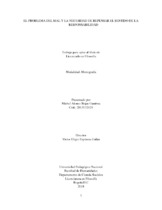El problema del mal y la necesidad de repensar el sentido de la responsabilidad.
Citación
Fecha
2018Autor
Rojas Gamboa, Michel Alonso
Director / Asesor / Tutor
Espinosa Galán, Víctor Eligio
Metadatos
Mostrar el registro completo del ítemResumen
El propósito de este trabajo fue mostrar que los modelos tradicionales de la responsabilidad moral son ineficaces a la hora de enfrentar el problema del mal, porque la reducen a una responsabilidad individualizada. Los problemas de que eso suceda son: en primer lugar, limita la idea de responsabilidad a una simple obligación de responder por los actos propios, lo que la reduce a un proceso post hoc. En segundo lugar, los criterios que se proponen para adjudicar responsabilidad omiten ciertos hallazgos de la psicología social en los que se muestra que la génesis de la acción no depende sólo del sujeto. En tercer lugar, cuando se siguen esos criterios para la atribución de responsabilidad, la manera de atender los problemas sociales se centra en readaptar a los individuos, aun cuando ello implique adaptarlos a
situaciones de injusticia. Así, es necesario ampliar el espectro de la responsabilidad, de manera que se la conciba en términos proactivos, es decir, que se fundamente en el compromiso por el cuidado del mundo.
Abstract
Evil as a problem was fundamentally an issue treated from the metaphysic perspective. For a long time, research turned around questions aiming at either determining its origin or clarifying its nature; as to this, we find works as Saint Augustin’s (1964) or Leibnitz’s (1954). Nevertheless, in the aftermath of the second World War this issue radically changed its focus. From then on, philosophers worried about finding strategies to avoid evil. In this sense, one of the concepts becoming the center of debate was responsibility. Time pressure for promoting a responsible subject came up in many authors conceiving this concept as an individual obligation face to rules; thus, excluding in its analysis contextual and situational variables. In this way, this text examines criteria that authors as Aramayo (1999/2011), Cruz (2000) and Kekes (2006) propose as classic for the assignment of responsibility. These criteria focus mainly on individual aspects as the ability to prevent the effects of actions or the power to avoid or produce an action. However, this individualist approach does not consider that not only personal factors interfere in the origin of action. As to this, social psychology research reveals mainly two problems. The first one, that the attribution process is ideological, as it does not result as a simple constructive process of sense of action, but essentially as an interpretation process veiled by ideological factors. We can clearly see this in Ross (1977) and Ichheiser (1949) works, who by means of the idea of fundamental attribution error show the bias in the overusing of dispositional factors over contextual ones in the explanation of an action. The second one, that situation and context have much interference in the origin of an action, as it was studied by Zimbardo (1997) in his Stanford prison experiment. As a result, from a comparative analysis between the concept of moral responsibility and research in social psychology, some problems underlying the way in which those authors characterize responsibility from an individualized perspective are shown. Among them, that the challenge to avoid evil does not appear as possible, as from that point of view it matters more to adapt the subject to society –even, also, to unfair situations– than to change social problems permitting evil to appear. Thence, we assume some elements that Arendt proposes respect to responsibility (1968) through the idea of extended responsibility, so that this is not only conceived as a reactive process, but as a commitment to take care of the world and thus facing the situations promoting the appearance of evil
Editorial
Universidad Pedagógica Nacional
Programa académico
Licenciatura en Filosofía

